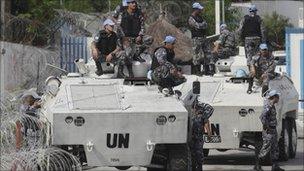UN chief warns of 'real risk' of Ivory Coast civil war
- Published

UN Secretary-General Ban Ki-moon has warned of a "real risk" of a return to civil war in Ivory Coast after the disputed presidential election.
He said incumbent Laurent Gbagbo was trying to expel UN peacekeepers.
The force, along with most of the international community, has recognised his rival Alassane Ouattara as victor.
Mr Gbagbo says the poll, meant to unify the country split by the 2002 war, was rigged in rebel areas. The Constitutional Council said he had won.
Mr Gbagbo's power base is in the south, while Mr Ouattara draws most of his support from the former rebels in the north.
In his first TV address since the poll Mr Gbagbo stressed his legitimacy.
He also offered to let a panel representing international powers examine the results of the election.
Mr Gbagbo said Mr Ouattara could leave the Golf Hotel in Abidjan, where he has set up his headquarters protected by the UN, but the BBC's John James in Abidjan says the blockade around the hotel remains in place.
The army meanwhile announced the lifting of a nightly curfew, so families could "enjoy the end of year holidays and the New Year".
'Mercenaries'
In a speech to the UN General Assembly on Tuesday, Mr Ban said he was worried about the 10,000-strong mission in Ivory Coast (Unoci).
Forces loyal to Mr Gbagbo were obstructing Unoci operations, and had blockaded the 800 peacekeepers protecting Mr Ouattara, he warned.
"I am concerned that this disruption of life-support supplies for the mission and the Golf Hotel will put our peacekeepers in a critical situation in the coming days," he said.
"Facing this direct and unacceptable challenge to the legitimacy of the United Nations, the world community cannot stand by," he added.
Earlier, an ally of Mr Gbagbo warned the peacekeepers that they could be treated as rebels if they did not go.
Mr Ban said that any attempt to "starve the United Nations mission into submission" would not be tolerated, and warned those who perpetrated such acts would be held accountable under international law.
He also revealed Unoci had confirmed "mercenaries, including freelance former combatants from Liberia, have been recruited to target certain groups in the population", and that an arms embargo was being broken.
The secretary-general added that he had sent a request from Mr Ouattara to the General Assembly's credentials committee to recognise his choice for permanent representative and rescind the credentials of Mr Gbagbo's envoy, Alcide Djedje, who he has appointed foreign minister.
'Evaluation committee'
Earlier, Mr Gbagbo appeared on state television for the first time since the election to restate his claim to be the country's legitimate leader.
Mr. Ban said the Gbagbo camp was trying to blockade the local UN peace-keeping mission
"I won the election with 51.45% of vote," he said. "I am the president of the Republic of Ivory Coast. I thank Ivorians for renewing their trust in me."
He attributed responsibility for the recent unrest to his "adversary's refusal to submit to the law".
Mr Ouattara and his supporters were nevertheless free to leave the Golf Hotel and "go where they like", he added.
However, our correspondent says checkpoints on major roads to the hotel are stopping all access, including for supplies and medicine.
Mr Gbagbo said he wanted the international community to set up an "evaluation committee", which would "have the mission to analyse the facts and the electoral process objectively in order to resolve the crisis peacefully".
Mr Ouattara responded to the address by saying that they had had five years of meetings and that no-one was in any doubt who had really won.
At least 50 people have been killed in violence linked to the dispute, the UN says.
The election, delayed for five years, was supposed to reunify the world's largest cocoa producer, which was split between the government-controlled south and rebel-controlled north in a civil war in 2002.
Earlier, the US introduced sanctions on around 30 close associates of Mr Gbagbo, following the lead taken by the European Union on Monday.